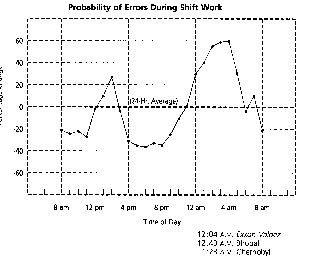
SIGNIFICANCE OF THE HUMAN CLOCK...
Shiftwork
 Shift work is a necessity in an industrially developed country.
Manufacturing, transportation, and health care rely on shift workers to
maintain operations around the clock. A shift worker can be defined
as someone who works evenings, nights, rotating shifts or extended shifts.
Approximately 20% of people employed in the United States work in shifts [3].
Do these workers have any special problems that might be attributed to
circadian disruption?
Shift work is a necessity in an industrially developed country.
Manufacturing, transportation, and health care rely on shift workers to
maintain operations around the clock. A shift worker can be defined
as someone who works evenings, nights, rotating shifts or extended shifts.
Approximately 20% of people employed in the United States work in shifts [3].
Do these workers have any special problems that might be attributed to
circadian disruption?
 Unlike jet lag, which is
usually a temporary disruption, shift work schedules and their disruptions can
last for years. Humans are diurnal creatures (active during the day), and
shift workers are often out of sync with environmental and social cues.
Circadian adjustment to a new shift is gradual (taking a week or more),
and changing to a new shift before adjustment is complete can cause perpetual
desynchronization. Research shows that shift workers suffer from
sleep disruption and fatigue, domestic disturbances, and health problems
such as gastrointestinal disorders and increased risk of cardiovascular
disease [3]. Task performance is also poorer at night [3]. The graph shows
the probability of errors during shift work over a 24-hour period.
Unlike jet lag, which is
usually a temporary disruption, shift work schedules and their disruptions can
last for years. Humans are diurnal creatures (active during the day), and
shift workers are often out of sync with environmental and social cues.
Circadian adjustment to a new shift is gradual (taking a week or more),
and changing to a new shift before adjustment is complete can cause perpetual
desynchronization. Research shows that shift workers suffer from
sleep disruption and fatigue, domestic disturbances, and health problems
such as gastrointestinal disorders and increased risk of cardiovascular
disease [3]. Task performance is also poorer at night [3]. The graph shows
the probability of errors during shift work over a 24-hour period.

Certainly shift work is not going to be abandoned by modern
society, but how can the circadian disruptions it causes be minimized? Many
large companies employ consulting firms (such as Circadian Technologies, Inc.)
to advise them on how to manage or prevent problems caused by shift work. The
Center for
Biological Timing is currently evaluating data from a major steel plant
 on the effects of the rate and
direction of shift rotation on accident rates. Researchers hope to compare,
for example, the number of accidents among workers who rotate from days to
evenings to nights with those who rotate from nights back to days [21]. Other
than adjusting schedules, "...implementing educational and support programs
regarding biological rhythms, sleep, and family counseling may be a good way
to improve the coping ability of shift workers" [3].
on the effects of the rate and
direction of shift rotation on accident rates. Researchers hope to compare,
for example, the number of accidents among workers who rotate from days to
evenings to nights with those who rotate from nights back to days [21]. Other
than adjusting schedules, "...implementing educational and support programs
regarding biological rhythms, sleep, and family counseling may be a good way
to improve the coping ability of shift workers" [3].

Accessibility statement
 Unlike jet lag, which is
usually a temporary disruption, shift work schedules and their disruptions can
last for years. Humans are diurnal creatures (active during the day), and
shift workers are often out of sync with environmental and social cues.
Circadian adjustment to a new shift is gradual (taking a week or more),
and changing to a new shift before adjustment is complete can cause perpetual
desynchronization. Research shows that shift workers suffer from
sleep disruption and fatigue, domestic disturbances, and health problems
such as gastrointestinal disorders and increased risk of cardiovascular
disease [3]. Task performance is also poorer at night [3]. The graph shows
the probability of errors during shift work over a 24-hour period.
Unlike jet lag, which is
usually a temporary disruption, shift work schedules and their disruptions can
last for years. Humans are diurnal creatures (active during the day), and
shift workers are often out of sync with environmental and social cues.
Circadian adjustment to a new shift is gradual (taking a week or more),
and changing to a new shift before adjustment is complete can cause perpetual
desynchronization. Research shows that shift workers suffer from
sleep disruption and fatigue, domestic disturbances, and health problems
such as gastrointestinal disorders and increased risk of cardiovascular
disease [3]. Task performance is also poorer at night [3]. The graph shows
the probability of errors during shift work over a 24-hour period.
 Shift work is a necessity in an industrially developed country.
Manufacturing, transportation, and health care rely on shift workers to
maintain operations around the clock. A shift worker can be defined
as someone who works evenings, nights, rotating shifts or extended shifts.
Approximately 20% of people employed in the United States work in shifts [3].
Do these workers have any special problems that might be attributed to
circadian disruption?
Shift work is a necessity in an industrially developed country.
Manufacturing, transportation, and health care rely on shift workers to
maintain operations around the clock. A shift worker can be defined
as someone who works evenings, nights, rotating shifts or extended shifts.
Approximately 20% of people employed in the United States work in shifts [3].
Do these workers have any special problems that might be attributed to
circadian disruption?
 on the effects of the rate and
direction of shift rotation on accident rates. Researchers hope to compare,
for example, the number of accidents among workers who rotate from days to
evenings to nights with those who rotate from nights back to days [21]. Other
than adjusting schedules, "...implementing educational and support programs
regarding biological rhythms, sleep, and family counseling may be a good way
to improve the coping ability of shift workers" [3].
on the effects of the rate and
direction of shift rotation on accident rates. Researchers hope to compare,
for example, the number of accidents among workers who rotate from days to
evenings to nights with those who rotate from nights back to days [21]. Other
than adjusting schedules, "...implementing educational and support programs
regarding biological rhythms, sleep, and family counseling may be a good way
to improve the coping ability of shift workers" [3].